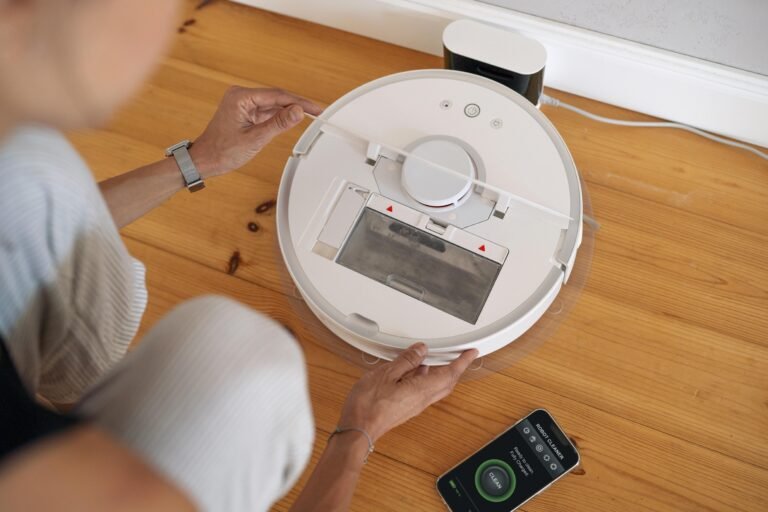Save Time & Money- Essential Home Maintenance Tips for Busy Homeowners
Life can get busy with work and family, and sometimes we forget about caring for our homes. But keeping up with regular home maintenance is important. It helps keep your house secure and working properly, saving you time and money later. If you plan to handle these tasks regularly, you can avoid big, expensive problems and have a nicer, more organized home.
Keeping your home in good shape isn’t just about fixing things when they break. It’s about setting up a regular schedule to check and maintain different parts of your house throughout the year. This helps you save money and reduces stress. You can plan for seasonal tasks to protect your home from weather damage and do simple monthly checks to ensure everything runs smoothly. Creating a maintenance plan that fits into your busy life is important. This guide will show you practical ways to save time while ensuring your home stays in great condition, even if you’re short on time.
What is Home Maintenance Basics?
Homeowners, especially those with busy schedules, should understand the basics of home maintenance. Home maintenance includes all the tasks needed to keep your house running smoothly, safely, and cost-effectively. This involves regular inspections, cleaning, fixing things, and replacing parts of your home when necessary. The aim is to avoid breakdowns, improve your home’s efficiency, and ensure everything lasts as long as possible.
For busy homeowners, it’s important to know which parts of your house need regular checks. This includes your heating and cooling systems, roof, plumbing, electrical systems, and the structure of your home itself. You should know what to check when to check it, and how often. Keeping up with these tasks helps prevent unexpected problems and repairs, and keeps your home comfortable and safe for your family. By understanding these basic maintenance tasks, you can set up a maintenance schedule that fits your busy life and ensures you don’t miss anything important.
What are Time-Saving Maintenance Strategies?
For homeowners who are always busy, adding some time-saving tips to your home maintenance plan can make a difference. These tips are all about being efficient and preventing problems before they start, so taking care of your home doesn’t become a huge task. Here are some useful ways to make home maintenance easier:
- Create a Maintenance Calendar: Set up a calendar for the year with all the maintenance tasks you need to do. You can organize it by season, month, or even week. This helps you keep track of everything and make sure you don’t forget important jobs. For instance, plan to clean your gutters in early fall and check your HVAC system before it gets hot in the summer.
- Use Technology: Take advantage of smart home technologies like thermostats, detectors, and sensors that can keep an eye on your heating, cooling, and water usage. These gadgets give you updates and warnings in real time, which can stop big problems before they happen and cut down on the need to check things all the time.
- Prioritize Tasks: Focus on maintenance tasks that give you the most benefit for your effort. For example, regularly cleaning your HVAC filters can prevent costly repairs and help save energy.
- Batch Similar Tasks: Combine similar maintenance jobs. If you’re climbing up to check the roof for leaks, take the time to look at your gutters, vents, and chimneys too. This way, you make the most out of each trip up the ladder.
- Hire Professionals for Routine Checkups: While doing it yourself can be good, for those who are always busy, hiring professionals for regular checkups can be a real time-saver. They might spot problems that you could miss, especially in complicated areas like electrical systems and structural parts of your house.
Using these time-saving strategies for maintenance can cut down the time you spend on upkeep. This lets you spend more time enjoying your home rather than just maintaining it.
What are the Cost-Effective Maintenance Tips?

Keeping your home in good shape without spending too much is important, especially if you’re careful with money. Cost-effective maintenance helps prevent big repairs and makes parts of your home last longer. Here are some tips to make home maintenance both affordable and effective:
- Regular Cleaning and Inspections: Simple tasks like cleaning drains, dusting vents, and checking for leaks can stop problems that would be expensive to fix later. Regularly checking the seals around windows and doors also helps keep your home energy-efficient, which can cut down on heating and cooling costs.
- DIY When Practical: Do the jobs you can handle yourself safely. This might include painting, caulking, simple plumbing fixes, or changing HVAC filters. There are plenty of tutorials and guides online that can help you do these projects confidently.
- Invest in Quality: When you need to replace something, choose high-quality products. They might cost more at first, but they last longer and work better, which saves you money over time because you won’t have to replace them as often.
- Utilize Energy-Efficient Upgrades: Think about adding things like LED lights, low-flow showerheads, and programmable thermostats. These upgrades can often save enough money on your utility bills over time to pay for themselves.
- Schedule Seasonal Maintenance: Doing certain tasks at specific times of the year can prevent expensive emergency repairs. For example, check your heating system in the fall and your air conditioning in the spring. This makes sure they work well and helps avoid breakdowns when you need them the most.
- Seek Professional Audits: Now and then, it’s a good idea to pay for a professional to check your home’s energy use or structure. They can spot problems early, which might save you from costly repairs later.
By following these cost-effective maintenance tips, homeowners can keep their tasks well-managed and expenses low, making sure their home stays valuable without costing too much.
Long-Term Maintenance Planning
Long-term maintenance planning is essential for homeowners who want to protect their investments and avoid unexpected problems. This approach means looking ahead and preparing for what your home will need in the future, ensuring that both your home and your budget are well managed. Here’s how to plan effectively for the long term:
- Conduct a Comprehensive Home Assessment: Begin by thoroughly inspecting your home to see its current condition and identify any potential issues that might arise later. Check the age of major systems like the roof, plumbing, and electrical systems to figure out when they might need to be replaced.
- Create a Long-Term Maintenance Schedule: After your assessment, make a maintenance plan that covers several years. Add tasks like repainting, roof replacement, updating appliances, and upgrading flooring. This approach not only helps you spread out costs over time but also lets you prioritize what needs to be done first.
- Set Aside a Maintenance Fund: Financial experts often suggest saving 1% to 3% of your home’s purchase price each year for maintenance and repairs. This fund will help you handle routine upkeep and manage bigger expenses that occur less often.
- Update Your Plan Annually: Every year, take a look at your maintenance plan and budget again. Update them based on what tasks you’ve completed, what needs to be done next, and any changes in your home’s condition or your financial situation.
- Use Warranties and Service Plans: If you have new appliances or major systems in your home, make sure to use their warranties and service plans. These can save you a lot of money on repairs and replacements.
- Plan for Upgrades That Add Value: Think about making upgrades that will increase your home’s value, like remodeling the kitchen or adding energy-efficient features. This is especially useful if you might sell your home later.
With careful long-term maintenance planning, homeowners can lessen the stress and cost of taking care of their property, making sure their home stays comfortable and valuable for many years.
Common Pitfalls to Avoid
When it comes to home maintenance, even the most careful homeowners can run into problems. Knowing the common mistakes can help you manage maintenance better, making sure your home stays in good shape. Here are some common errors to avoid:
- Neglecting Regular Inspections: A big mistake is skipping routine checks. If you don’t inspect your home regularly, you might miss small problems that could turn into expensive repairs. It’s important to regularly look over your home’s systems and structure to catch issues early.
- Delaying Minor Repairs: When life is hectic, it’s easy to put off small repairs, but this can cause bigger, more costly problems later. Fixing things like leaky faucets or cracks in the walls right away can stop these issues from getting worse.
- Overestimating DIY Skills: Doing it yourself can save money, but thinking you can do more than you actually can might end up costing you. Poorly done projects often need to be fixed by professionals later. It’s important to know when a job is too complicated and it’s time to call in a professional, especially for things like electrical work or structural changes.
- Under-budgeting for Maintenance: Not setting aside enough money for home maintenance can lead to postponing needed repairs, which harms your home’s condition. Make sure you have a realistic budget that can cover both small fixes and big repairs.
- Ignoring Manufacturer’s Instructions: Always follow the maintenance and care guidelines provided by the manufacturer for your appliances and systems. This helps them work better and last longer, and it often keeps your warranties valid.
- Choosing Low-Quality Replacements: While cheaper, low-quality materials or parts might seem like a good deal at first, they can cause your maintenance costs to increase over time. It’s better to invest in high-quality products that are more durable and perform better.
Avoiding these common mistakes can help homeowners take better care of their properties, saving money and extending the life of their home components.
In conclusion
In conclusion, effective home maintenance is very important for busy homeowners who want to save time and money while keeping their homes in great condition. By learning the basics of home maintenance, using time-saving tips, focusing on affordable practices, planning for the future, and avoiding common mistakes, homeowners can set up a maintenance routine that works well and lasts long. Remember, the secret to good home care is doing regular checks, fixing problems quickly, and planning carefully. By being proactive today, you can ensure your home is safe, efficient, and comfortable for the future, and also increase its value.
FAQs
What are the most important home maintenance tasks for saving time?
Focus on preventive tasks like cleaning HVAC filters, inspecting roof shingles, and checking for leaks in plumbing to prevent bigger, more time-consuming issues later.
How often should I perform a general home inspection?
Conduct a general home inspection at least once a year to identify potential issues early. Consider seasonal inspections to address specific needs related to weather changes.
Can smart home technology help save time on home maintenance?
Yes, smart home devices like thermostats, smoke detectors, and leak sensors can automate routine checks and alert you to issues immediately, saving you time on manual inspections.
What is the best way to budget for home maintenance?
Set aside 1% to 3% of your home’s purchase price each year for maintenance. This helps cover routine upkeep and prepare financially for larger repairs.







